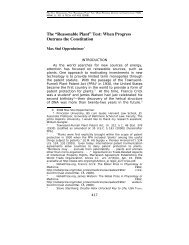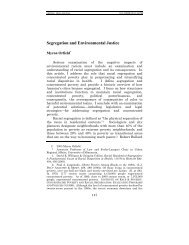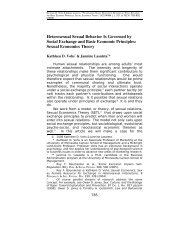An Organizational Approach to the Design of Patent Law
An Organizational Approach to the Design of Patent Law
An Organizational Approach to the Design of Patent Law
You also want an ePaper? Increase the reach of your titles
YUMPU automatically turns print PDFs into web optimized ePapers that Google loves.
6 VERTINSKY FINAL_JAD (DO NOT DELETE) 2/27/2012 2:20 PM<br />
2012] AN ORGANIZATIONAL APPROACH 269<br />
property protection should “contribute <strong>to</strong> <strong>the</strong> promotion <strong>of</strong><br />
technological innovation and <strong>to</strong> <strong>the</strong> transfer and dissemination<br />
<strong>of</strong> technology.” 244 This third principle in particular reflects <strong>the</strong><br />
fact that <strong>the</strong> TRIPS framework must accommodate countries<br />
with very different needs and interests, and that its implementation<br />
should reflect normative concerns such as access <strong>to</strong><br />
health. Many <strong>of</strong> <strong>the</strong> proposals for international patent policy<br />
change take <strong>the</strong> form <strong>of</strong> proposed changes <strong>to</strong> <strong>the</strong> TRIPS framework,<br />
such as efforts <strong>to</strong> build in expanded or restricted abilities<br />
<strong>to</strong> use compulsory licensing and expanded or restricted definitions<br />
<strong>of</strong> patentable subject matter. 245 The mechanisms for effecting<br />
change in <strong>the</strong> rules and <strong>the</strong>ir enforcement are complex<br />
and go beyond simple law-making processes. Moreover, a<br />
change in <strong>the</strong> rules doesn’t go very far in changing behavior, as<br />
demonstrated by <strong>the</strong> relative lack <strong>of</strong> utilization <strong>of</strong> <strong>the</strong> compulsory<br />
licensing provisions fought for as part <strong>of</strong> <strong>the</strong> Doha Declaration.<br />
246 Finally, it is difficult <strong>to</strong> connect <strong>the</strong> changes proposed<br />
at <strong>the</strong> international level with implications for domestic patent<br />
law and domestic innovation.<br />
The organizational approach moves us beyond <strong>the</strong> view <strong>of</strong><br />
international patent law as simply a system <strong>of</strong> formal rules and<br />
<strong>to</strong>wards a view <strong>of</strong> <strong>the</strong> system as a set <strong>of</strong> both formal and informal<br />
rules that are <strong>the</strong> product <strong>of</strong> <strong>the</strong> diverse relationships and<br />
arrangements that shape <strong>the</strong> system’s development, adoption,<br />
and economic impact. The organizational approach suggests<br />
that a first step in more effective reform <strong>of</strong> international patent<br />
law is <strong>to</strong> recognize <strong>the</strong> relative importance <strong>of</strong> informal rules in<br />
international law-making, implementation, and enforcement.<br />
Informal rules play a significant role in shaping international<br />
law, and in determining how agreed upon rules are interpreted,<br />
implemented, and enforced. 247 A variety <strong>of</strong> ac<strong>to</strong>rs, both public<br />
244. TRIPS Agreement, supra note 242, at 1200.<br />
245. See generally Gervais, supra note 197 (analyzing <strong>the</strong> TRIPS agreement,<br />
with particular emphasis on <strong>the</strong> impact intellectual property has on<br />
economic activity).<br />
246. See Amir Attaran, Assessing and <strong>An</strong>swering Paragraph 6 <strong>of</strong> <strong>the</strong> Doha<br />
Declaration on <strong>the</strong> TRIPS Agreement and Public Health: The Case for Greater<br />
Flexibility and a Non-Justiciability Solution, 17 EMORY INT’L L. REV. 743,<br />
746–751 (2003).<br />
247. See, e.g., Pitman B. Potter, Globalization and Business Regulation in<br />
Local Context, in A GUIDE TO BUSINESS LAW IN ASIA 13–16 (Pitman B. Potter<br />
& Ljiljana Biuković eds., 2008) (proposing a selective adaption paradigm<br />
which addresses <strong>the</strong> implementation <strong>of</strong> international legal norms in <strong>the</strong> context<br />
<strong>of</strong> local culture and legal traditions).






